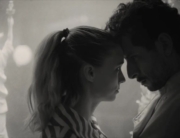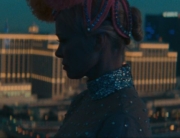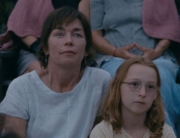
Early on in this weighty drama, Antonio (Justin Chon, who doubles as director and writer) sits for a job interview that goes poorly from the start. While he is affable and friendly, the interviewer is terse and only focuses on two things: Antonio’s ethnicity, which is Korean, and the fact the young man was previously arrested on felony charges. Much of the film’s conflict centers on his race and criminal record, which dovetail into a weight Antonio struggles to get out from under.
Antonio is in the United States illegally. He was brought to the country at age three by adopted parents who neglected to file the paperwork that would have led to citizenship. Although Antonio has built a life for himself in New Orleans that includes a loving wife, Kathy (Alicia Vikander), who is pregnant with the couple’s first child, and a stepdaughter, Jessie (Sydney Kowalske), whom he treats like his own, he finds all of this imperiled following an incident involving Kathy’s ex, Ace (Mark O’Brien), a police officer who ran off on her but now wants visitation rights with Jessie.
What starts off as an argument escalates into violence, thanks to Ace’s partner (Brad Blanchard), who is either racist against Antonio, one of those cops who can’t tolerate anything short of absolute deference, or both. After Antonio lands in the hands of Immigration and Customs Enforcement, he and Kathy speak to a lawyer (Vondie Curtis-Hall), who explains Antonio’s lack of legal status. Since a judge has already ruled that he is to be deported due to his past felonies, Antonio has two options: voluntarily self-deport back to South Korea and then hope to reenter the States legally or appeal, with no chance to coming back if he loses.
The couple opts to fight, but in order to pay the lawyer’s retainer fee, Antonio secretly goes back to what led to those felonies in the first place: stealing motorcycles, leading to a tense heist sequence that feels like it belongs in a different movie. It also doesn’t help that Chon doesn’t clarify up front the consequences for Antonio if he gets arrested again: Is he automatically kicked out of the country and loses any chance to appeal? Ace doesn’t seem to know either, but he is aware Antonio will be deported, enough so to repeatedly tell Kathy that she better not go to South Korea with Jessie. (But what will or can he do if she tries? That’s never discussed amid all the dagger eyes). He also confronts Antonio at a garage and tells him that he knows Antonio was behind the thefts, although he doesn’t have any evidence.
Looking back, it’s possible Ace is a more nuanced character than he initially seemed, by not detaining Antonio or searching the garage on purpose, but the film has so much to juggle and gives so little access to Ace’s thoughts that we can’t tell. To be fair, even Antonio’s actions are difficult to parse at times. He won’t listen to the lawyer’s key piece of advice—to reach out to certain parties whom Antonio is estranged from, so they can speak on his behalf at the appeal—but he’ll steal to pay the attorney’s fee. Why doesn’t Antonio just get a different lawyer who’s cheaper?
Besides hazy character motivations, it’s not always clear what ends Chon has in mind. I haven’t even mentioned the older Vietnamese woman, Parker (Linh Dan Pham), who Antonio meets during a hospital visit to see Kathy and runs into again as he hands out flyers for the tattoo parlor where he works. Perhaps she is supposed to represent Antonio’s connection to anything resembling his cultural heritage, which he lost after he arrived on these shores, just as he might remind Parker of a brother she lost when her family escaped Vietnam.
The scenes between them develop an intimacy that is, in some ways, deeper than that between Antonio and Kathy. As immigrants, they share something that might never be understood by those who didn’t also arrive at this country from the outside. However, I had trouble making the connection between that and Antonio’s legal jeopardy. The two story lines never quite gel. Parker could have been excised from the movie completely with no effect on Antonio’s race against time. (On a similar note, we learn early on that Parker has terminal cancer, but that also seems extraneous and, sadly, the film would have been equally bleak even without that detail).
If Blue Bayou ultimately seems a little too ambitious for its reach, it isn’t without admirable qualities, especially Chon’s knack for creating unique Asian characters. (Similarly, his debut feature, Gook, centered on a pair of second-generation Korean American brothers, one of whom has a love of soul music.) The combination of Antonio’s extensive tats, love of motorbikes, and heavy Southern accent (which only occasionally drops off) make him unlike the majority of onscreen Asian protagonists who have come before. I only wish he had appeared in a better movie.
















Leave A Comment